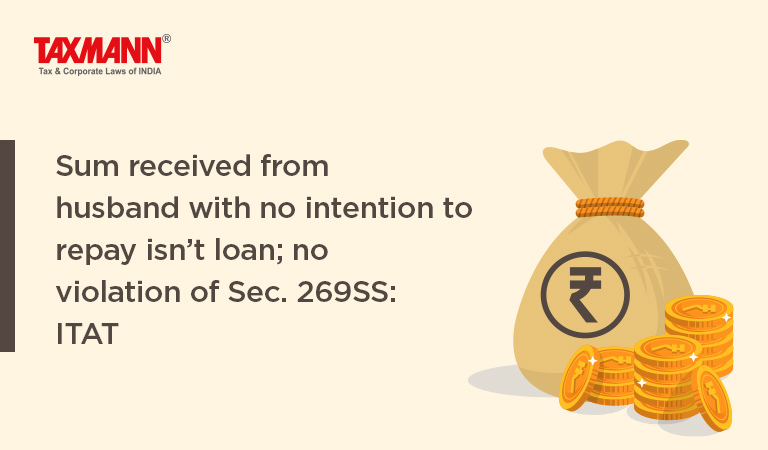Sum received from husband with no intention to repay isn’t loan; no violation of Sec. 269SS: ITAT
- Blog|News|Income Tax|
- 2 Min Read
- By Taxmann
- |
- Last Updated on 4 March, 2022

Case Details: Smt. Meera Devi Kumawat v. JCIT - [2021] 132 taxmann.com 21 (Jaipur - Trib.)
Judiciary and Counsel Details
-
- Sandeep Gosain, Judicial Member and Vikram Singh Yadav, Accountant Member
- Rahul Sanghi, CA for the Assessee.
- Smt. Monisha Choudhary for the Revenue.
Facts of the Case
Assessee was an illiterate individual having income from renting of marriage garden. Assessing Officer (AO) noted that assessee’s husband had given her loan of Rs. 9,00,000. The assessee was asked to show cause as to why penalty under section 271D should not be levied?
The assessee submitted that she had received Rs. 6,00,000 by way of demand draft for payment towards the purchase of plot and remaining Rs. 3,00,000 was received in cash. She stated that the cash of husband and wife could not be separated as it is in joint custody. Therefore, it cannot be taken as a loan. However, AO rejected assessee’s contention. On appeal, CIT(A) also upheld the order of AO. Aggrieved-assessee filed the appeal before the Tribunal.
ITAT Held
The Tribunal has held that the assessee had offered a reasonable explanation justifying the cash transaction. The provision of Sec 269SS does not bar genuine cash transactions of loans but only bar those transactions which are entered with the intention of evade taxes. In the instant case, the assessee had not evaded any tax but only purchased a property with her husband’s help for the residence of her family members.
Further, there was no relationship of the debtor and creditor between husband and wife. There was also no interest part in the amount. The transaction did not involve any interest element, and there was no promise to return the amount with or without interest. Accordingly, no penalty should be levied for violation of the provisions of section 269SS.
Disclaimer: The content/information published on the website is only for general information of the user and shall not be construed as legal advice. While the Taxmann has exercised reasonable efforts to ensure the veracity of information/content published, Taxmann shall be under no liability in any manner whatsoever for incorrect information, if any.

Taxmann Publications has a dedicated in-house Research & Editorial Team. This team consists of a team of Chartered Accountants, Company Secretaries, and Lawyers. This team works under the guidance and supervision of editor-in-chief Mr Rakesh Bhargava.
The Research and Editorial Team is responsible for developing reliable and accurate content for the readers. The team follows the six-sigma approach to achieve the benchmark of zero error in its publications and research platforms. The team ensures that the following publication guidelines are thoroughly followed while developing the content:
- The statutory material is obtained only from the authorized and reliable sources
- All the latest developments in the judicial and legislative fields are covered
- Prepare the analytical write-ups on current, controversial, and important issues to help the readers to understand the concept and its implications
- Every content published by Taxmann is complete, accurate and lucid
- All evidence-based statements are supported with proper reference to Section, Circular No., Notification No. or citations
- The golden rules of grammar, style and consistency are thoroughly followed
- Font and size that’s easy to read and remain consistent across all imprint and digital publications are applied



 CA | CS | CMA
CA | CS | CMA
